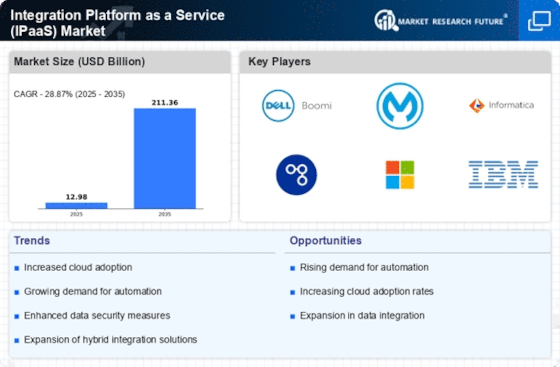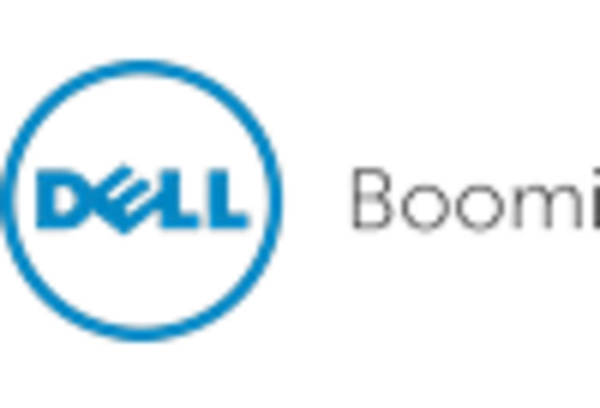-
Executive Summary
-
Scope of the Report
-
Market Definition
-
Scope of the Study
- Research Objectives
- Assumptions & Limitations
-
Markets Structure
-
Market Research Methodology
-
Research Process
-
Secondary Research
-
Primary Research
-
Forecast Model
-
Market Landscape
-
Porter’s Five Forces Analysis
- Threat of New Entrants
- Bargaining power of buyers
- Threat of substitutes
- Segment rivalry
-
Value Chain/Supply Chain of Global Integration Platform as a Service Market
-
Industry Overview of Global Integration Platform as a Service Market
-
Introduction
-
Growth Drivers
-
Impact analysis
-
Market Challenges
-
Market Trends
-
Introduction
-
Growth Trends
-
Impact analysis
-
Global Integration Platform as a Service Market by Service Type
-
Introduction
-
Cloud Service Orchestration
- Market Estimates & Forecast, 2022-2030
- Market Estimates & Forecast by Region, 2022-2030
-
Data Transformation
- Market Estimates & Forecast, 2022-2030
- Market Estimates & Forecast by Region, 2022-2030
-
API Management
- Market Estimates & Forecast, 2022-2030
- Market Estimates & Forecast by Region, 2022-2030
-
Data Integration
- Market Estimates & Forecast, 2022-2030
- Market Estimates & Forecast by Region, 2022-2030
-
Real-Time Monitoring & Integration
- Market Estimates & Forecast, 2022-2030
- Market Estimates & Forecast by Region, 2022-2030
-
Business to Business (B2B) & Cloud Integration
- Market Estimates & Forecast, 2022-2030
- Market Estimates & Forecast by Region, 2022-2030
-
Application Integration
- Market Estimates & Forecast, 2022-2030
- Market Estimates & Forecast by Region, 2022-2030
-
Training & Consulting
- Market Estimates & Forecast, 2022-2030
- Market Estimates & Forecast by Region, 2022-2030
-
Support & Maintenance
- Market Estimates & Forecast, 2022-2030
- Market Estimates & Forecast by Region, 2022-2030
-
Global Integration Platform as a Service Market by Deployment
-
Introduction
-
Public Cloud
- Market Estimates & Forecast, 2022-2030
- Market Estimates & Forecast by Region, 2022-2030
-
Private Cloud
- Market Estimates & Forecast, 2022-2030
- Market Estimates & Forecast by Region, 2022-2030
-
Hybrid Cloud
- Market Estimates & Forecast, 2022-2030
- Market Estimates & Forecast by Region, 2022-2030
-
Global Integration Platform as a Service Market by Organization Size
-
Introduction
-
SMEs
- Market Estimates & Forecast, 2022-2030
- Market Estimates & Forecast by Region, 2022-2030
-
Large Enterprises
- Market Estimates & Forecast, 2022-2030
- Market Estimates & Forecast by Region, 2022-2030
-
Global Integration Platform as a Service Market by Vertical
-
Introduction
-
BFSI
- Market Estimates & Forecast, 2022-2030
- Market Estimates & Forecast by Region, 2022-2030
-
Healthcare
- Market Estimates & Forecast, 2022-2030
- Market Estimates & Forecast by Region, 2022-2030
-
Manufacturing
- Market Estimates & Forecast, 2022-2030
- Market Estimates & Forecast by Region, 2022-2030
-
Education
- Market Estimates & Forecast, 2022-2030
- Market Estimates & Forecast by Region, 2022-2030
-
Media & Entertainment
- Market Estimates & Forecast, 2022-2030
- Market Estimates & Forecast by Region, 2022-2030
-
IT & Telecommunication
- Market Estimates & Forecast, 2022-2030
- Market Estimates & Forecast by Region, 2022-2030
-
Government
- Market Estimates & Forecast, 2022-2030
- Market Estimates & Forecast by Region, 2022-2030
-
Others
- Market Estimates & Forecast, 2022-2030
- Market Estimates & Forecast by Region, 2022-2030
-
Global Integration Platform as a Service Market by Region
-
Introduction
-
North America
- Market Estimates & Forecast, 2022-2030
- Market Estimates & Forecast by Service Type, 2022-2030
- Market Estimates & Forecast by Deployment, 2022-2030
- Market Estimates & Forecast by Organization Size, 2022-2030
- Market Estimates & Forecast by Vertical, 2022-2030
- U.S.
- Canada
- Mexico
-
Europe
- Market Estimates & Forecast, 2022-2030
- Market Estimates & Forecast by Service Type, 2022-2030
- Market Estimates & Forecast by Deployment, 2022-2030
- Market Estimates & Forecast by Organization Size, 2022-2030
- Market Estimates & Forecast by Vertical, 2022-2030
- Germany
- France
- Italy
- Spain
- U.K
-
Asia Pacific
- Market Estimates & Forecast, 2022-2030
- Market Estimates & Forecast by Service Type, 2022-2030
- Market Estimates & Forecast by Deployment, 2022-2030
- Market Estimates & Forecast by Organization Size, 2022-2030
- Market Estimates & Forecast by Vertical, 2022-2030
- China
- India
- Japan
- Rest of Asia Pacific
-
Rest of the World
- Market Estimates & Forecast, 2022-2030
- Market Estimates & Forecast by Service Type, 2022-2030
- Market Estimates & Forecast by Deployment, 2022-2030
- Market Estimates & Forecast by Organization Size, 2022-2030
- Market Estimates & Forecast by Vertical, 2022-2030
- The Middle East & Africa
- Latin America
-
Company Landscape
-
Company Profiles
-
Dell Boomi, Inc. (U.S.)
- Company Overview
- Product/Business Segment Overview
- Financial Updates
- Key Developments
-
Informatica Corporation (U.S.)
- Company Overview
- Product/Business Segment Overview
- Financial Updates
- Key Developments
-
MuleSoft, Inc. (U.S.)
- Company Overview
- Product/Business Segment Overview
- Financial Updates
- Key Developments
-
IBM Corporation (U.S.)
- Company Overview
- Product/Business Segment Overview
- Financial Updates
- Key Developments
-
Oracle Corporation (U.S.)
- Company Overview
- Product/Business Segment Overview
- Financial Updates
- Key Developments
-
SAP SE (Germany)
- Company Overview
- Product/Business Segment Overview
- Financial Updates
- Key Developments
-
SnapLogic, Inc. (U.S.)
- Company Overview
- Product/Business Segment Overview
- Financial Updates
- Key Developments
-
Celigo, Inc. (U.S.)
- Company Overview
- Product/Business Segment Overview
- Financial Updates
- Key Developments
-
Jitterbit, Inc. (U.S.)
- Company Overview
- Product/Business Segment Overview
- Financial Updates
- Key Developments
-
Scribe Software Corporation (U.S.)
- Company Overview
- Product/Business Segment Overview
- Financial Updates
- Key Developments
-
DBSync (U.S.)
- Company Overview
- Product/Business Segment Overview
- Financial Updates
- Key Developments
-
Flowgear (South Africa)
- Company Overview
- Product/Business Segment Overview
- Financial Updates
- Key Developments
-
Conclusion
-
-
LIST OF TABLES
-
Global Integration Platform as a Service Market: By Region, 2022-2030
-
North America Integration Platform as a Service Market: By Country, 2022-2030
-
Europe Integration Platform as a Service Market: By Country, 2022-2030
-
Asia-Pacific Integration Platform as a Service Market: By Country, 2022-2030
-
Middle East & Africa Integration Platform as a Service Market: By Country, 2022-2030
-
Latin America Integration Platform as a Service Market: By Country, 2022-2030
-
Global Integration Platform as a Service by Service Type Market: By Regions, 2022-2030
-
North America Integration Platform as a Service by Service Type Market: By Country, 2022-2030
-
Europe Integration Platform as a Service by Service Type Market: By Country, 2022-2030
-
Table10 Asia-Pacific Integration Platform as a Service by Service Type Market: By Country, 2022-2030
-
Table11 Middle East & Africa Integration Platform as a Service by Service Type Market: By Country, 2022-2030
-
Table12 Latin America Integration Platform as a Service by Service Type Market: By Country, 2022-2030
-
Table13 Global Integration Platform as a Service by Deployment Market: By Regions, 2022-2030
-
Table14 North America Integration Platform as a Service by Deployment Market: By Country, 2022-2030
-
Table15 Europe Integration Platform as a Service by Deployment Market: By Country, 2022-2030
-
Table16 Asia-Pacific Integration Platform as a Service by Deployment Market: By Country, 2022-2030
-
Table17 Middle East & Africa Integration Platform as a Service by Deployment Market: By Country, 2022-2030
-
Table18 Latin America Integration Platform as a Service by Deployment Market: By Country, 2022-2030
-
Table19 Global Integration Platform as a Service by Organization Size Market: By Regions, 2022-2030
-
Table20 North America Integration Platform as a Service by Organization Size Market: By Country, 2022-2030
-
Table21 Europe Integration Platform as a Service by Organization Size Market: By Country, 2022-2030
-
Table22 Asia-Pacific Integration Platform as a Service by Organization Size Market: By Country, 2022-2030
-
Table23 Middle East & Africa Integration Platform as a Service by Organization Size Market: By Country, 2022-2030
-
Table24 Latin America Integration Platform as a Service by Organization Size Market: By Country, 2022-2030
-
Table25 Global Integration Platform as a Service by Vertical Market: By Regions, 2022-2030
-
Table26 North America Integration Platform as a Service by Vertical Market: By Country, 2022-2030
-
Table27 Europe Integration Platform as a Service by Vertical Market: By Country, 2022-2030
-
Table28 Asia-Pacific Integration Platform as a Service by Vertical Market: By Country, 2022-2030
-
Table29 Middle East & Africa Integration Platform as a Service by Vertical Market: By Country, 2022-2030
-
Table30 Latin America Integration Platform as a Service by Vertical Market: By Country, 2022-2030
-
Table31 Global Deployment Market: By Region, 2022-2030
-
Table32 Global Organization Size Market: By Region, 2022-2030
-
Table33 North America Integration Platform as a Service Market, By Country
-
Table34 North America Integration Platform as a Service Market, By Service Type
-
Table35 North America Integration Platform as a Service Market, By Deployment
-
Table36 North America Integration Platform as a Service Market, By Organization Size
-
Table37 North America Integration Platform as a Service Market, By Vertical
-
Table38 Europe: Integration Platform as a Service Market, By Country
-
Table39 Europe: Integration Platform as a Service Market, By Service Type
-
Table40 Europe: Integration Platform as a Service Market, By Deployment
-
Table41 Europe: Integration Platform as a Service Market, By Organization Size
-
Europe: Integration Platform as a Service Market, By Vertical
-
Table43 Asia-Pacific: Integration Platform as a Service Market, By Country
-
Table44 Asia-Pacific: Integration Platform as a Service Market, By Service Type
-
Asia-Pacific: Integration Platform as a Service Market, By Deployment
-
Asia-Pacific: Integration Platform as a Service Market, By Organization Size
-
Asia-Pacific: Integration Platform as a Service Market, By Vertical
-
Table48 Middle East & Africa: Integration Platform as a Service Market, By Country
-
Table49 Middle East & Africa Integration Platform as a Service Market, By Service Type
-
Table50 Middle East & Africa Integration Platform as a Service Market, By Deployment
-
Table51 Middle East & Africa: Integration Platform as a Service Market, By Organization Size
-
Table52 Middle East & Africa: Integration Platform as a Service Market, By Vertical
-
Table53 Latin America: Integration Platform as a Service Market, By Country
-
Table54 Latin America Integration Platform as a Service Market, By Service Type
-
Table55 Latin America Integration Platform as a Service Market, By Deployment
-
Table56 Latin America: Integration Platform as a Service Market, By Organization Size
-
Table57 Latin America: Integration Platform as a Service Market, By Vertical
-
-
LIST OF FIGURES
-
Global Integration Platform as a Service Market Segmentation
-
Forecast Methodology
-
Five Forces Analysis of Global Integration Platform as a Service Market
-
Value Chain of Global Integration Platform as a Service Market
-
Share of Global Integration Platform as a Service Market in 2020, by country (in %)
-
Global Integration Platform as a Service Market, 2022-2030,
-
Sub segments of Service Type
-
Global Integration Platform as a Service Market size by Service Type, 2020
-
Share of Global Integration Platform as a Service Market by Service Type, 2022-2030
-
Global Integration Platform as a Service Market size by Deployment, 2020
-
Share of Global Integration Platform as a Service Market by Deployment, 2022-2030
-
Global Integration Platform as a Service Market size by Organization Size, 2022-2030
-
Share of Global Integration Platform as a Service Market by Organization Size, 2022-2030
-
Global Integration Platform as a Service Market size by Vertical, 2022-2030
-
Share of Global Integration Platform as a Service Market by Vertical, 2022-2030
-
'


















Leave a Comment